Construction Materials Laboratory
About Our Laboratory
GCI-Lab is an institute’s testing laboratory, mainly opened for ITC’s students for understanding the practical experiment test in the research fields and in the civil engineering fields. On the other hand, we are accepting some exterior testing to make close cooperation between ITC and private companies in developing quality materials use. GCI-Lab delivers superior value to all its customer by leveraging its expertise in material testing services, inspection, consulting, research and training.
The laboratory is government owned. Lab’s equipment was aided by CIUF (Coopération Universitaire Institutionnelle Universités Francophones de Belgique), CF (Coopération Française) and ministry of education and work. All equipments are approved in accordance with the relevant international and municipality standards and specifications.
GCI-Lab is empowered with young, skillful and experienced professional to deliver quality services through provision of precise, reliable and timely results. All tests are based on internationally accepted standards, procedures and specifications (ASTM, AASHTO, BS, EN, NF).
Our Purpose
To develop awareness in public by using the technology in fields of Civil Engineering for the benefit and comfort of life.
Our Core Values
- Trust & Transparency
- Work Towards ‘Excellence’
- Team Work
- Create Lasting Relationship
Our Services
Construction Materials Laboratory provides testing and analysis on:
- Steel: UTS, Yield strength, 0.2% proof stress, % Elongation tests
- Cement: Standard Consistency, Setting Time (Initial and Final), Compressive Strength, Density tests
- Coarse Aggregate: Strength class, Sieve Analysis (Gradation), Bulk Density (Fine), Crushing Value, Water Absorption, Specific gravity (Coarse / Fine), Flakiness & Elongation Index, soundness (Sodium Sulfate), Clay lumps, Los Angeles Abrasion
- Fine Aggregate: Sieve Analysis (Gradation), Bulk Density (Fine), Water Absorption, Specific gravity (Coarse / Fine), Clay lumps, soundness (Sodium Sulfate), Sand’s property, Finer than 0.075mm by Washing Test
- Concrete (Cube/Cylinder): Compressive Strength, density, water absorption, tensile strength (Fendage Method)
- Solid Block, AAC Block, CLC Block: Compressive strength, water absorption
- Paving block: Water absorption, Compressive strength
- Concrete core: Compressive strength
- Concrete beam: Flexural test
- Concrete mixed design: Conventional method
- Ceramic Tiles : Dimensional analysis, water absorption, modulus of rupture, Compressive strength
- Brick Masonry and Masonry Prism: Compressive Strength, Water absorption test
- Polyethylene Pipe: Tensile Strength test
- Timber: Shear, Flexion, Compressive, Tensile strength test
- Calibration: Compression Testing Machine, Tension Testing Machine, Concrete hammer calibration
- NDT tests: Rebound hammer test
Major Equipments
- Vicat apparatus: Setting time and consistency of cement
Standards: ASTM C191, EN 196-3, NF P15-414
The apparatus consists of a metal frame with a graduated scale. The needle or plunger is attached to the bottom end of the rod to make up the test weight of 300g. Apparatus’s accessories are depending on the requirement of Standards, ASTM, AASHTO and EN.
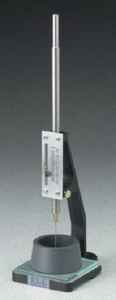
- Apparatus for the measurement of bulk density of cement: Bulk density /Specific gravity (Relative density) of Cement
It is used to determine the bulk density of cement as specified by the “Comission des méthodes d’essai des matériaux de construction”. It consists of a sieve funnel, a unit weight measure 1 litre capacity, a tripod and straightedge.
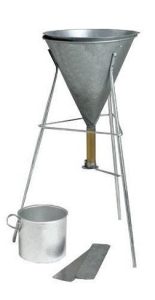
- Le Chatelier flask
Standards: ASTM C188, AASHTO T133, EN 196-3
It is used to determine the specific gravity of hydraulic cement and lime, Glass flask 250ml capacity, with graduated neck from 0 to 1ml and from 18 to 24ml in 0.1ml graduation with accuracy of 0.05ml.
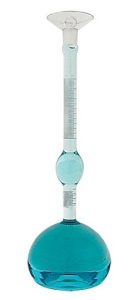
- Mortar mixer
EN 196-1, 413-2, 459-2, BS 3892, ASTM C305, AASHTO T162, ISO 679
A robust mixer for the efficient mixing of cement mortars as required by the relevant specifications. A table mounted unit with planetary mixing action. The bowl and beater are easily fitted and removed from the mixer.
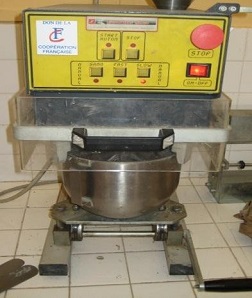
- Jolting apparatus
Standards: EN 196-1
It is used to compact cement/mortar prisms in Determination of Cement strength moulds.
The mould table is mounted above a cam which is driven by a driven by a heavy duty gearbox at 60 r.p.m. the machine is supplied complete with start/stop switch, drop counter, and emergency stop switch.
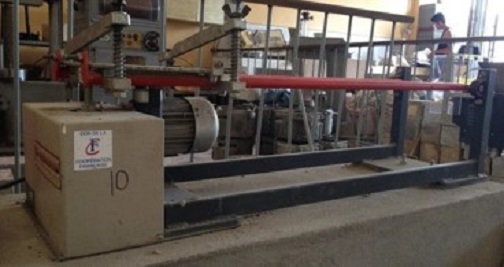
- Slump cone: Manufactured from sheet steel protected against corrosion. Top dia. 100mm, base dia. 200mm, height 300mm. Weight approx. 2kg.
Standards: EN 12350-2, BS 1881: 102, ASTM C143, AASHTO T119, NF P18-305
It is used to determine the workability of a fresh concrete mix.
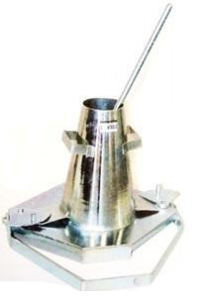
- Air entrainment meter
Standards : EN 12350-7, BS 1881: 106, ASTM C231, NF P18-353
It is used to determine the air content of fresh concrete, it comprises a sealed vessel of 5 litre capacity. Lid with fast-closing system incorporates a pressure gauge (0-2.5 bar). Range of measurement 0-10%. Graduated scale (0.1% division).
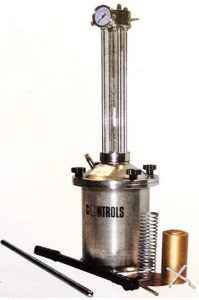
- Compression Testing Machine
Standard : ASTM C496, NF P18-408
These machines have been designed for compression tests on large size concrete specimens such as 300mm cubes or 250mm dia. x 500mm high cylinders.
Compression tester 1000kN capacity with Datamatic microprocessor digital display and processing system.
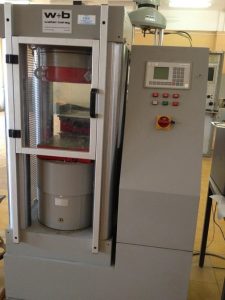
- Tensile and Flexural Testing Machine
Standard : ASTM C39, NF P18-411, AASHTO T22, BS 1610
This machine has been designed for use in the laboratory where it is necessary to perform tension test on steel rebars up to 25mm diameter.
Tension/Flexion tester, 600kN/50kN capacity with Datamatic microprocessor digital display and processing system.
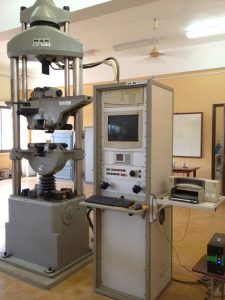

KHEM Ratha
Head of Construction Materials Laboratory
Head of Construction Materials Laboratory PHONE NUMBER 012 723 036 EMAIL info-fgc@itc.edu.kh

